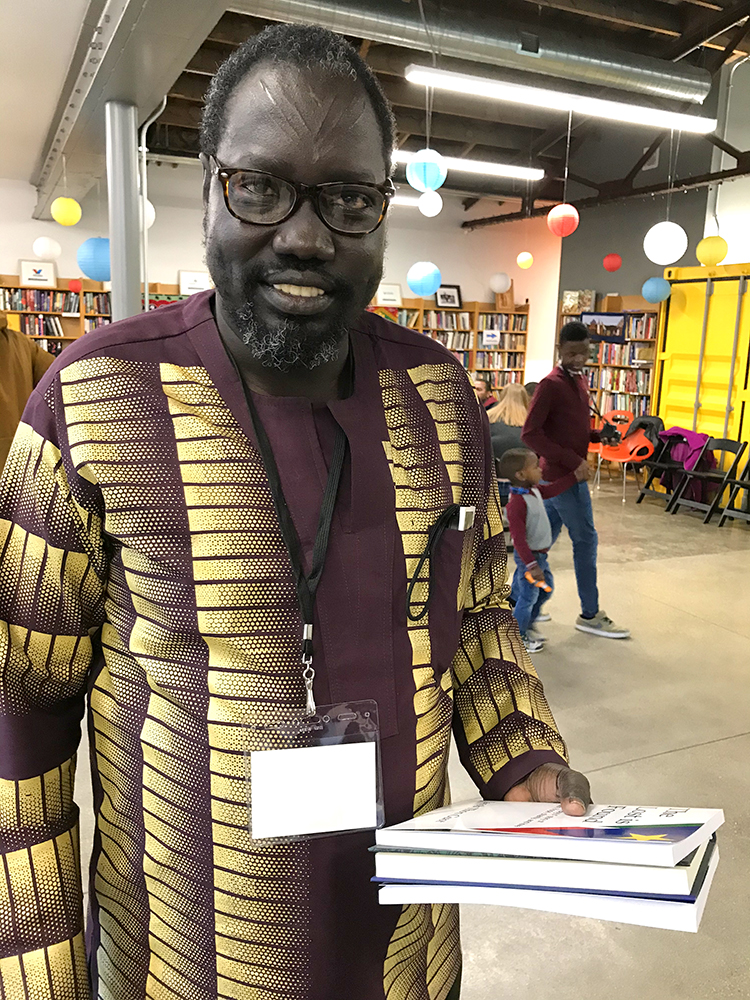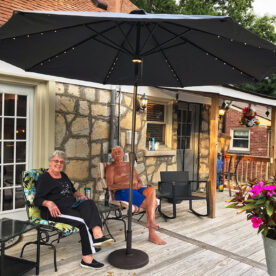“I am in charge of how I feel and today I choose happiness.” ~ Unknown

He picked me out of the crowd from across the room. I was just standing, looking about, temporarily unengaged from everyone, enjoying the beauty in the room. Suddenly, he handed me his iPhone and asked, “Will you take our picture?” Mind you, I didn’t have my camera with me and I wasn’t playing on my phone. He was also alone so I wasn’t sure who “our” was. “Of course I will,” I happily replied while thinking to myself, “Of all the people in this room how did you pick me?” He turned his back to me and began walking around the room gathering this person and that as if he hadn’t just handed a perfect stranger his expensive iPhone. He never once turned to look for me. It was a level of trust you just don’t see anymore. Eventually, the people he gathered were the authors I wrote about yesterday: The Wilsons, Otiene, and Musoni. He stood proudly with the four and I snapped. I returned the phone, and without missing a beat, I found myself engaged in an unexpected conversation with him: Jacob Thon Guot. Before his phone had left my hand he’d launched into a story about his book, “The Lost is Found: A ‘Lost Boy’s’ Story of Faith, Hope, Charity, and Love.” I wasn’t quite sure I heard him right because I knew what lost boys were and I was 100% certain he wasn’t talking about the Keifer Sutherland movie about teenage vampires. Jacob ushered me to the table where a copy of his book lay, and there he began to tell me about himself in earnest. If you’re not familiar, The Lost Boys is a term given to the 20,000+ orphaned or separated boys during the second Sudanese Civil War (1987-2005). These boys averaged between six and seven years old. Some were conscripted to fight for the northern Sudanese Muslim Army, but most of them walked a thousand miles to Ethiopia’s refugee camps. Not men, boys. Little boys. They only had each other and the clothes on their back. Some didn’t even have shoes. Many died of starvation, dehydration, snake bites, lion or crocodile attacks. Jacob is one of those boys who survived the trek and made it to the U.S. He was seven years old when he became a Lost Boy. He was 21 when he came to America. He spent 14 years in refugee camps. I gladly bought his book and I’ve read a great deal of it already. He talks in frank terms about the Sudanese Muslims who meant to eradicate the southern black Sudanese Christians to which Jacob and his family belong. He is from the Dinka tribe so it’s fascinating to learn how he has managed his cultural traditions – such as the scarification on his forehead – while coexisting with his deeply held Christian faith. Today, he is an ordained Episcopal Priest with two masters degrees from Asbury College. He is a mentor with Kentucky Refugee Ministries as well as acting as a minister, though I’m not sure where. He was quick to point out his credentials, but not as quick as he was to point out his love of God. His spirit is strong and his faith palpable. He autographed the book for me. “Thank you for reading my book,” he wrote. Whatever drew him my way, I’m thankful for it. People like Jacob enrich my life in unbelievable ways. You can read more about the Lost Boys here, and listen to Jacob’s oral history from African Immigrants in the Bluegrass here.


Kathy
Synchronicity and the Circle of Love. Ain’t it grand!